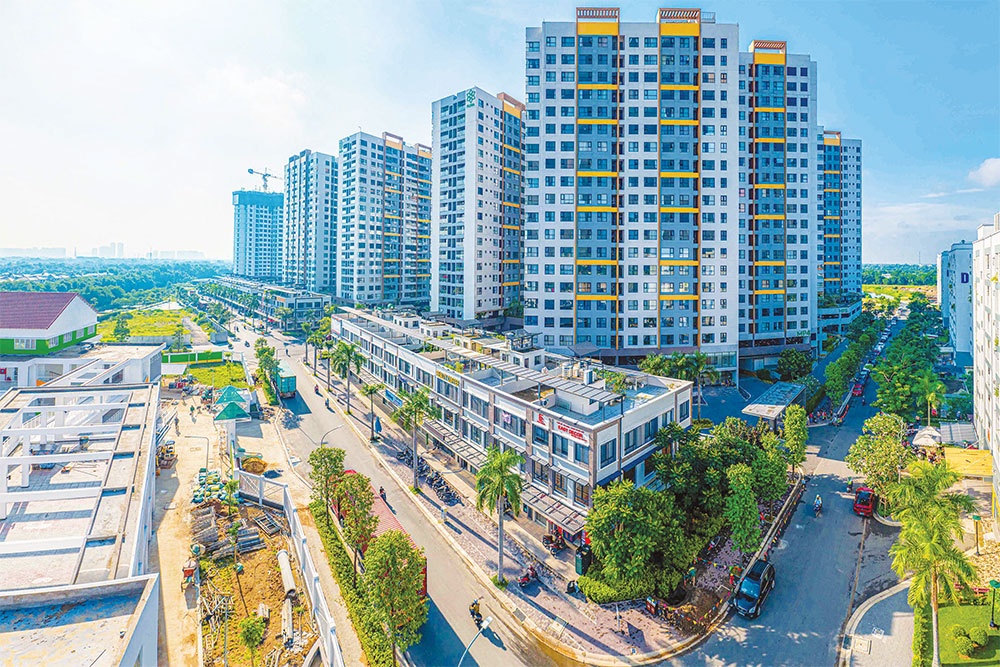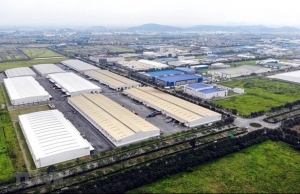INTERNATIONAL INVESTMENT
AND PORTAL
The State Bank of Vietnam at the end of November officially adjusted the credit growth limit from 1.5 to 2 per cent for credit institutions. This percentage expects to add another $6.5-8.7 billion of the credit source for the economy and is being deemed an opportunity for businesses to access more capital for production and operation.
 Real estate hoping to build on positive sentiment, photo Le Toan
Real estate hoping to build on positive sentiment, photo Le Toan
Nguyen Anh Que, member of the Executive Committee of the Vietnam Real Estate Association, said that the credit extension is a positive signal for the entire economy as well as the real estate sector.
“The move creates a positive effect for the whole market and will reduce the assets which are offered in the market with sharp distress, reducing the risk of crisis or freeze in the market,” Que said.
In addition, according to Que, the credit extension will positively impact consumption because the period around Lunar New Year is the favourite time for Vietnamese people to take on consumer loans or buy property.
“When the cash flows come back, the first impact will be on the stock market. In recent days, real estate stock increased both in volume and value. This helps investors have more capital to conduct business as well as maintain their operation,” Que added.
Immediately after the credit extension, some projects reacted to the market. Hung Thinh Corporation, the investor of Lavita Charm in Ho Chi Minh City, announced the end of a sale with 40 per cent discount for apartment buyers if 98 per cent of the payment is fully paid up front.
“The discount ended on November 30 and we are still waiting for a new policy to apply for December. But the same discount will not be repeated,” said Hung Trinh salesman Xuan Truong.
Reviewing delayed schemes
At the end of November, the Prime Minister decided to set up a working group with the task of removing issues in the implementation of projects in Hanoi, Ho Chi Minh City, and other locations.
According to Nguyen Manh Ha, vice chairman of the Vietnam Real Estate Association, the establishment of a working group is a timely action in the context of real estate difficulties.
“However, also of importance is perfecting the legal system, controlling the structure of real estate, and creating new supply,” Ha said.
Furthermore, real estate businesses are required to actively innovate, improve the environment, and be more creative to catch up with trends as well as customers’ needs, Ha added, towards the goal of safe, healthy, and sustainable development.
Meanwhile, Van Duc, an investor in Ho Chi Minh City, said that real estate is generally a safe investment channel that can even bring attractive profits when the market fluctuates.
“Even in the midst of volatility, high-quality properties that meet realistic needs continue to increase in value and are much sought after,” Duc insisted.
Complexities remain
Despite some promising signs, a report released last week by VNDirect Securities assessed that a harsh winter is coming to the residential real estate market.
“Investors face difficulties in debt restructuring due to tightening bank loans to real estate and strict supervision in the issuance of corporate bonds. Secondly, rising interest rates weaken demand for homes. New supply may also decline as the legal approval process waits to be cleared with the revised Law on Land,” the report said.
VNDirect estimates about $2 billion of real estate corporate bonds will have to be paid in the first half of 2023 and $2.78 billion in the second half of 2023, putting pressure on liquidity to repay loans.
In fact, the residential real estate industry is facing many challenges, the report continued. “Tight monetary policy leads to short-term liquidity pressure. Currently, bank loans and bond issuance are important capital mobilisation channels for real estate developers in Vietnam,” it said.
Meanwhile, sales in the third quarter of 2022 decreased significantly by 40 per cent compared to the previous quarter in both Ho Chi Minh City and Hanoi markets. Amid tightening bank loans, stumbling bond markets, and sluggish sales, the cash flow of many property developers is drying up.
“We expect the average price of primary apartments to decrease 5-10 per cent on-year and the number of apartments sold to drop by about 20 per cent on-year in 2023,” VNDirect said.
In addition, the market also faces the increasing risk of exceeding loan repayment capacity due to escalating house prices and rapidly increasing home loan interest rates in 2022-2023. Homebuyers will find it even harder to access mid-end apartments with a selling price of $2,000 per sq.m in Ho Chi Minh City and Hanoi, even for those with twice the average annual income ($5,500-7,500). Furthermore, the situation could worsen in 2023 as many homebuyers take on rising interest rates.
According to the new launch plan of some investors, many projects may be delayed in 2023 in the context of the legal approval process waiting to be kept up with the revised Law on Land, and homebuyers becoming more confident with limited credit lines and inflation.
VNDirect forecasts that the new supply of apartments in Ho Chi Minh City in 2023 will remain low with about 19,000-20,000 units, down 10 per cent over the same period and about 15,000 units will be sold, down 20 per cent over the same period of last year. The new supply, meanwhile, will remain low in both Ho Chi Minh City and Hanoi, at 1,000-2,000 units open for sale only in 2023.
Tran Khanh Quang-General director Viet An HoaThe State Bank of Vietnam’s decision to adjust this year’s credit growth cap by 1.5 to 2 per cent will bring positive sentiment to the real estate market. With this additional credit, the amount of money pumped into the economy is considerable and concentrated in the last month of the year.
Therefore, the loosening of credit limit will have a positive impact on production and business enterprises. Although the additional credit growth is for the production and business sector, it still has a positive effect on the real estate market. Because when lending for production and business is stable, income is more stable, then the liquidity in the market will increase.
In the short term, real estate prices will continue to decrease by about 3-5 per cent in Ho Chi Minh City and its suburbs, while prices in other provinces have fallen sharply in some provinces.
Vo Hong Thang-Deputy director of Research and Development DKRA GroupThe two key phrases of the current real estate market is “out of room” and “high profit”. These two issues must be solved synchronously to stabilise the market.
Real estate businesses are happy with limit extension even if the interest rate is fixed at high level. However, the investors cannot afford the high interest rate. Rates of 12-15 per cent per year is enough to hinder buyers from bank loans.
The market is now looking for a stimulating package to support the real estate market, similar to the $1.3 billion package released for 2012-2015. Even though it is a small volume, it helps investors and developers to regain confidence to continue in the real estate market.
Parallel to the loosening of credit cap for banks, there are two issues that need to be carried out, which is to speed up legal removal to make the supply more abundant, especially in the affordable housing and social housing segment. For businesses that are issuing bonds that are about to expire but have not yet arranged capital, they need to actively negotiate with bondholders a debt repayment plan. A solution to transfer bonds’ value to property can be considered before it’s too late.
 Pauses put paid to real estate M&A
Pauses put paid to real estate M&A
Difficulties in legal procedures are slowing down the flow of real estate mergers and acquisitions from foreign investors, with some units pausing or restructuring their strategies.
 Real estates companies pivot on remote work trends
Real estates companies pivot on remote work trends
New flexible working methods are seeing a slew of real estate players revamping their approach to take advantage of the market and meet the growing demand for travel and remote work from clients.
 Industrial property an outlier within a weakening market
Industrial property an outlier within a weakening market
In the midst of a difficult time in real estate in many segments, from land plots to individual houses and apartments, industrial real estate remains attractive to both investors and tenants.



















